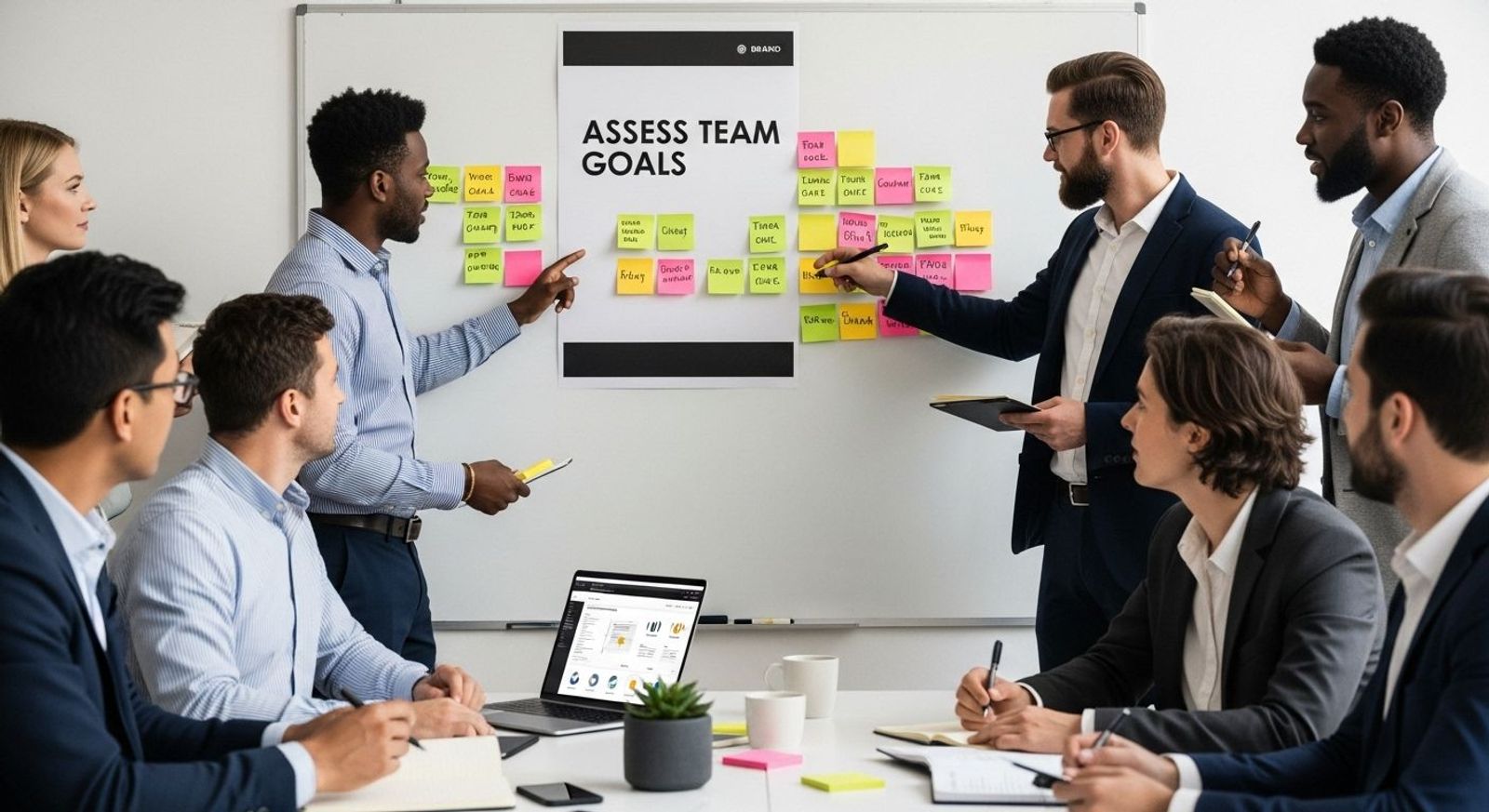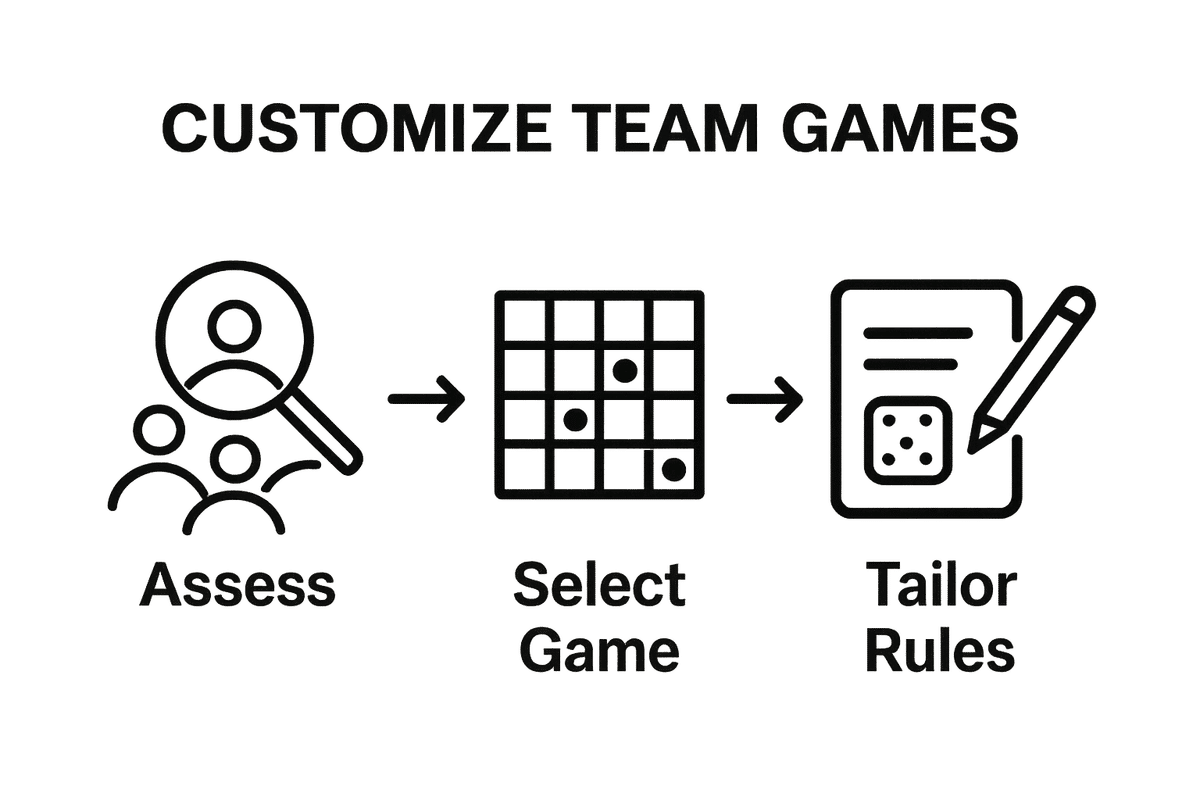Professional Bar Trivia SoftwareFor Venues & Events
- Players join via QR code — no app download
- 6 round types: Buzzer Race, Everyone Answers & more
- Rich media questions with images, video & audio
- Real-time scoring & leaderboards on the big screen
How to Customize Team Games for Enhanced Collaboration
September 20, 2025

Teams spend an average of over 30 percent of their time on collaboration and meetings. That sounds productive at first glance. Yet most team building exercises fall flat or feel like forced fun. Choosing the right team game actually starts way before picking a game at all. The real secret is customizing each activity based on your team’s actual dynamics and goals.
Table of Contents
- Step 1 Assess Team Goals And Dynamics
- Step 2 Select Appropriate Game Types And Themes
- Step 3 Tailor Rules And Objectives To Fit Your Team
- Step 4 Set Up The Logistical Framework For Execution
- Step 5 Execute The Customized Games Effectively
- Step 6 Gather Feedback And Refine The Experience
Quick Summary
| Key Point | Explanation |
|---|---|
| 1. Assess team dynamics thoroughly | Understanding individual strengths and challenges is essential for effective game customization and team development. |
| 2. Choose games aligned with objectives | Selecting appropriate game types ensures they resonate with your team's unique needs and skill goals. |
| 3. Tailor rules to fit team needs | Modifying game rules enhances focus on specific skills, making the experience more impactful and relevant. |
| 4. Create a solid logistical plan | A comprehensive logistical framework ensures smooth execution, maximizing participation and engagement during the activity. |
| 5. Collect and analyze feedback systematically | Gathering diverse feedback enhances future team-building activities, providing insights for continual improvement and growth. |
Step 1: Assess Team Goals and Dynamics
Customizing team games begins with a critical foundation: understanding your team's unique characteristics, goals, and interpersonal dynamics. This initial assessment determines the effectiveness of any subsequent team-building activity. Effective game customization requires deep insight into your team's current state, challenges, and collective aspirations.
Begin by scheduling a comprehensive team evaluation session where you can observe interactions, communication patterns, and existing team relationships. During this assessment, focus on understanding individual strengths, potential communication barriers, and areas where collaboration could be improved. Look beyond surface-level interactions and analyze how team members currently problem solve, handle conflicts, and support one another.
Utilize structured diagnostic tools to gain meaningful insights. According to University of Minnesota's team development strategies, organizational assessments should reveal nuanced team dynamics. Consider administering anonymous surveys or conducting one on one interviews to collect candid feedback about team performance, interpersonal relationships, and perceived challenges.
Key assessment dimensions should include:
- Communication effectiveness
- Trust levels between team members
- Problem solving approaches
- Comfort with collaborative work
- Individual and collective motivation
Carefully analyze the collected data to identify specific areas where customized team games can address underlying team development needs. For instance, if survey results reveal communication gaps, design games that explicitly enhance verbal and non verbal interaction skills. If trust appears low, prioritize activities promoting mutual understanding and vulnerability.
Successful assessment means developing a comprehensive understanding of your team's current state and potential growth areas. The insights gathered will directly inform game design, ensuring that each activity is purposefully crafted to address specific team dynamics and developmental objectives. By approaching team game customization through this methodical, data driven lens, you transform generic team building into a strategic organizational development tool.
Step 2: Select Appropriate Game Types and Themes
After comprehensively assessing your team's dynamics, the next critical step is selecting game types and themes that will resonate deeply with your team's specific needs and developmental goals. The right game can transform a mundane team building exercise into a powerful learning and collaboration experience.
Choosing appropriate games requires a nuanced approach that goes beyond surface level entertainment. Consider your team's unique characteristics such as professional background, skill levels, and existing interpersonal relationships. For instance, a technical team might respond differently to strategy based games compared to a creative marketing group. Some teams might thrive on competitive challenges, while others require cooperative gameplay that emphasizes collective achievement.
According to Johns Hopkins University's collaborative skills development research, game selection should align with specific skill development objectives. This means mapping game mechanics directly to team improvement goals. If communication is a challenge, select games that require complex verbal coordination. If problem solving needs enhancement, choose strategy games with multilayered challenges that demand collaborative thinking.
Consider these game category considerations:
- Puzzle solving games for analytical teams
- Role playing scenarios for communication improvement
- Strategic board games requiring collective decision making
- Simulation exercises mimicking real world workplace challenges
- Creative problem solving activities
Themes matter as much as game mechanics. A well chosen theme can increase engagement and make learning feel less like work and more like an enjoyable experience. Technology companies might appreciate games with digital or futuristic themes, while creative agencies could prefer more abstract or artistic game designs. The key is creating an environment where team members feel comfortable, challenged, and motivated to participate fully.
To help you identify the best game type and theme for your team, the following table summarizes major options alongside the team characteristics and developmental goals they support.
| Game Type / Theme | Best For | Developmental Focus |
|---|---|---|
| Puzzle Solving | Analytical teams, technical groups | Problem solving, logical thinking |
| Role Playing | Teams needing communication improvement | Verbal interaction, empathy |
| Strategic Board Games | Teams seeking better decision making | Collaboration, strategy, leadership |
| Simulation Exercises | Real-world workplace challenge scenarios | Adaptability, process improvement |
| Creative Problem Solving | Creative agencies, marketing teams | Innovation, idea generation |
| Digital/Futuristic Themes | Technology and IT teams | Engagement, scenario planning |
| Artistic/Abstract Themes | Creative agencies, design teams | Visualization, creativity |
Successful game selection means finding that perfect balance between entertainment and meaningful skill development. Your chosen games should feel less like mandatory training and more like an exciting opportunity for team growth and personal connection.
Step 3: Tailor Rules and Objectives to Fit Your Team
Customizing game rules and objectives transforms a generic team building activity into a precisely targeted developmental experience. Thoughtful modifications can turn standard games into powerful tools for enhancing team dynamics, communication, and collaborative skills.
The art of tailoring game rules requires a deep understanding of your team's unique characteristics and learning needs. This process goes beyond simple rule adjustments it involves strategically redesigning game mechanics to address specific team challenges. Consider how existing game structures can be modified to emphasize skills your team needs to develop most urgently.
Begin by identifying the core skills or behaviors you want to strengthen. If your team struggles with communication, modify game rules to require more complex verbal interaction or create scoring mechanisms that reward clear and concise communication. For teams with trust issues, introduce collaborative elements that mandate mutual support and shared decision making.
According to PubMed research on team productivity, targeted game modifications can significantly impact team performance. This means intentionally designing rules that push team members out of their comfort zones while maintaining an environment of psychological safety.
Consider these strategic rule modification approaches:
- Introduce time pressure to simulate real world workplace challenges
- Create hybrid scoring systems that balance individual and team performance
- Design role rotation mechanisms to encourage empathy and understanding
- Implement collaborative problem solving requirements
- Add reflection and feedback stages within game play
The most effective rule customizations feel natural and engaging, not forced or punitive.
 Your modifications should challenge team members while maintaining a sense of fun and excitement. Pay attention to individual team member personalities avoid creating rules that might alienate or overly stress participants.
Your modifications should challenge team members while maintaining a sense of fun and excitement. Pay attention to individual team member personalities avoid creating rules that might alienate or overly stress participants.
Successful rule tailoring means creating a game experience that feels simultaneously familiar and transformative. The ultimate goal is to design an activity that organically develops team skills while providing an enjoyable, memorable experience that team members will discuss long after the game concludes.

Step 4: Set up the Logistical Framework for Execution
Establishing a robust logistical framework transforms your team game from a conceptual idea into a seamless, engaging experience. Meticulous planning determines the difference between a memorable team building activity and a disorganized event that fails to achieve its intended objectives.
Begin by creating a comprehensive timeline that outlines every aspect of game preparation and execution. This includes determining the precise date, time, and duration of the activity. Consider team schedules, potential conflicts, and optimal times when team members are most likely to be energized and receptive. Some teams might prefer morning sessions for maximum engagement, while others might find after work hours more conducive to relaxed participation.
Physical and digital infrastructure play crucial roles in successful game implementation. Assess your available resources carefully. Will the game be conducted in person, remotely, or using a hybrid approach? Ensure you have appropriate technology platforms, communication tools, and physical spaces that support the selected game type. This might involve reserving meeting rooms, setting up video conferencing software, or preparing specific digital collaboration platforms.
According to research on collaborative logistics frameworks, successful execution depends on clear communication channels and well defined roles. Assign specific responsibilities to team members involved in game preparation and facilitation. Identify a game master or facilitator who understands the objectives and can guide participants through the experience smoothly.
Consider these critical logistical preparation elements:
- Technology and equipment readiness
- Clear communication of game rules and expectations
- Backup plans for potential technical or participation challenges
- Appropriate space configuration
- Necessary materials and resources
Establish a comprehensive communication plan that provides participants with all necessary information before the event. This includes detailed instructions, expected preparation, required materials, and any pre game tasks. A well informed team arrives prepared, reducing potential friction and maximizing the activity's effectiveness.
Successful logistical frameworks create an environment where team members can focus entirely on the game experience.
Below is a checklist table to help you prepare thoroughly for a seamless team game experience, ensuring all logistical aspects are addressed before execution.
| Preparation Task | Purpose | Responsible Party | Status |
|---|---|---|---|
| Schedule date and time | Maximize participation and energy | Organizer | |
| Secure physical/digital space | Ensure proper venue or platform | Facilities/IT | |
| Test technology/equipment | Prevent technical issues | IT Support | |
| Communicate game instructions | Align expectations and participation | Organizer | |
| Prepare materials/resources | Ensure all needed items are ready | Organizer | |
| Assign facilitator/game master | Guide process and respond in real time | Team Lead/HR | |
| Establish backup plans | Address potential conflicts or disruptions | Organizer |
Step 5: Execute the Customized Games Effectively
Successful game execution requires more than simply following predetermined rules it demands active facilitation, emotional intelligence, and a keen understanding of team dynamics. The most meticulously designed game can fall flat without skillful implementation that keeps participants engaged, challenged, and psychologically safe.
Begin by setting a positive tone from the moment participants arrive. Your initial introduction should create an atmosphere of excitement and psychological safety, making it clear that the activity is about learning and growing together, not competing or judging. Clearly communicate the game's objectives, expected behaviors, and the developmental goals underlying the activity. This transparency helps participants understand the purpose beyond mere entertainment.
During gameplay, your role as a facilitator is crucial. Observe interactions closely, but avoid micromanaging. Allow team members to navigate challenges independently while remaining available to provide gentle guidance or reset expectations if the activity veers off course. Pay attention to group energy levels, individual engagement, and emerging team dynamics. Be prepared to make real time adjustments that maintain the activity's momentum and learning potential.
According to PubMed research on team productivity, collaborative activities can significantly enhance team performance when executed with intentionality. This means creating moments for reflection, encouraging open communication, and ensuring that every team member feels valued and heard throughout the experience.
Consider these critical execution strategies:
- Maintain a balance between structure and spontaneity
- Encourage participation from quieter team members
- Create opportunities for meaningful interaction
- Monitor emotional temperature of the group
- Be ready to pivot if the current approach is not working
After the game concludes, facilitate a comprehensive debrief session. This is where the real learning happens. Guide participants through a structured reflection process that connects game experiences to real world team challenges. Ask probing questions that help team members articulate insights, emotional responses, and potential behavioral changes inspired by the activity.
Successful game execution transforms a simple activity into a powerful team development experience. By remaining flexible, empathetic, and focused on collective growth, you create an environment where learning feels natural, engaging, and deeply meaningful.
Step 6: Gather Feedback and Refine the Experience
Feedback collection transforms team games from one time events into continuous improvement opportunities. The most powerful learning occurs not during the game, but in the reflective moments that follow, where genuine insights emerge and future experiences can be strategically enhanced.
Immediately after the game concludes, create a structured environment for open and honest feedback. This means designing multiple feedback channels that accommodate different communication styles. Some team members might feel comfortable sharing thoughts verbally during a group discussion, while others prefer anonymous written surveys or digital feedback forms. By offering diverse input methods, you ensure a more comprehensive and nuanced understanding of the team's experience.
Design your feedback collection with precision and intention. Develop questions that go beyond surface level reactions, probing deeper into the learning experience. Ask participants to reflect on specific moments that challenged them, surprised them, or revealed new perspectives about their teammates. Encourage individuals to share not just what happened during the game, but how the experience made them feel and what insights they gained about team dynamics.
According to research exploring AI driven feedback systems, advanced feedback mechanisms can provide unprecedented insights into team interactions. While you may not have access to sophisticated AI tools, you can apply similar principles by creating multilayered feedback opportunities that capture both quantitative and qualitative data.
Consider these strategic feedback collection approaches:
- Immediate post game verbal debrief
- Anonymous digital surveys
- Small group reflection sessions
- Individual written reflections
- Peer to peer feedback exchanges
Analyze the collected feedback systematically. Look for recurring themes, unexpected observations, and specific suggestions for improvement. Pay attention not just to what was said, but also to what might have been left unsaid. Sometimes the most valuable insights emerge from reading between the lines of participant responses.
Successful feedback gathering is an art of creating psychological safety while simultaneously pushing for genuine, constructive insights. By treating each team game as a learning laboratory, you transform team building from a static event into a dynamic, continuously evolving process of collective growth and understanding.
Turn Assessment Insights Into Action With Custom Team-Building Games
After reading about how customized games unlock better collaboration, you might be wondering how to put these concepts into practice for your own team. If you are facing challenges like unclear communication, low trust, or difficulty energizing your group for real growth, you are not alone. The article highlighted the importance of tailored game rules, engaging themes, and rich feedback in driving real team improvement. But finding the right tools to implement these personalized activities can be tough.
Looking to strengthen emotional connections? Start with our emotions game collection to target self-awareness and empathy in your next team session.

Now is your chance to move beyond generic team-building and design experiences that truly resonate. Visit quizado.com to discover customizable quiz games that support every step from team assessment through feedback. Download our platform, upload your branding, and use our built-in question banks or your own content. Give your team the transformation they deserve—take the first step today by exploring quizado.com.
Frequently Asked Questions
How can I assess my team's dynamics for game customization?
Begin by scheduling a team evaluation session to observe interactions, communication patterns, and areas for improvement. Use tools like anonymous surveys or one-on-one interviews to gather feedback on trust levels, problem-solving approaches, and individual motivations.
What types of games are best suited for team building activities?
Choose games that align with your team's specific needs and dynamics. For instance, puzzle-solving games can work well for analytical teams, while role-playing scenarios can improve communication. The key is to select games that provide a balance between entertainment and skill development.
How can I tailor game rules to fit my team's specific challenges?
Identify the core skills your team needs to develop and modify game rules to emphasize these areas. For example, if communication is a challenge, you could create scoring systems that reward effective verbal interaction and collaboration among team members.
What should I include in my post-game feedback process?
Design a structured environment for feedback collection immediately after the game. Offer various channels like verbal debriefs, anonymous surveys, or small group reflections. Ask questions that encourage participants to share specific insights and emotional responses to enhance future experiences.
Recommended
Start Hosting Bar Trivia Tonight
Try Quizado free — no download needed. Host your first trivia night tonight!

